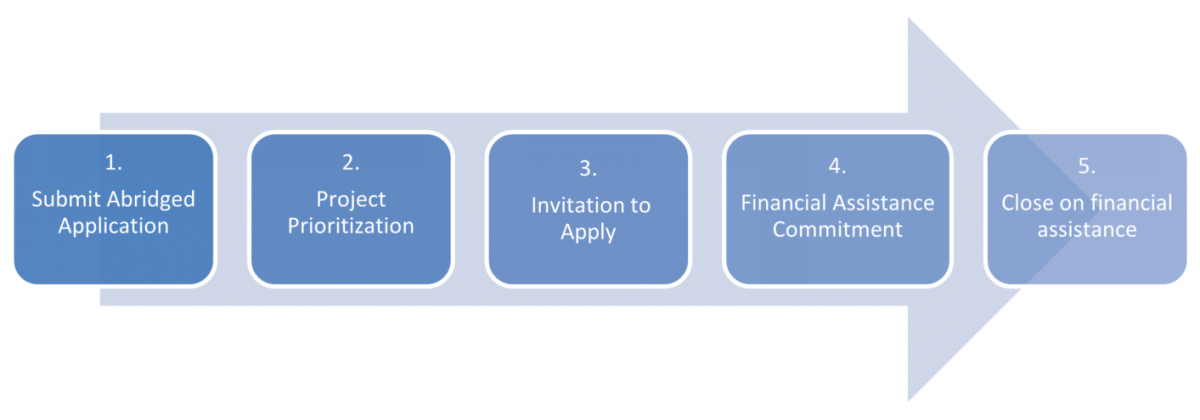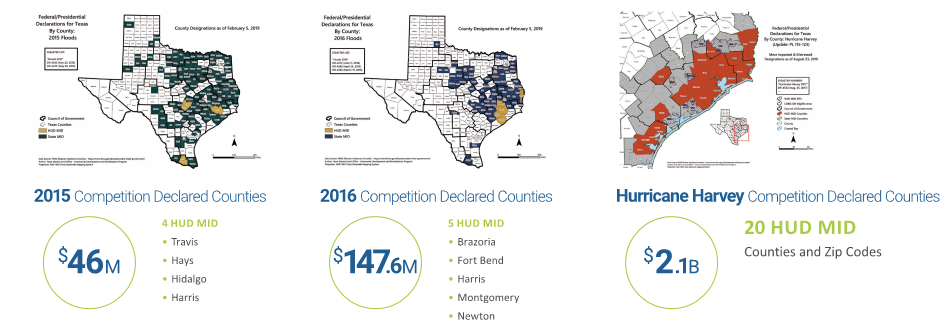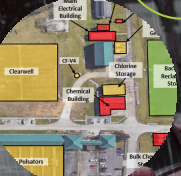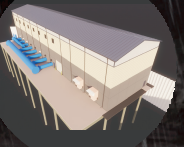Avenues to Fund Your Infrastructure: FIF and CDBG
This ongoing series will spotlight upcoming infrastructure funding opportunities, both State and Federal. In this installment, we feature two imminent opportunities (one zero percent interest rate State loan and one Federal grant), both related to flooding and both with application deadlines in the summer of 2020. (Click here to read the previous post: Coronavirus Exposes Long-Standing Infrastructure Funding Vulnerabilities.)
Flood Infrastructure Fund (FIF)
Approved by Texas voters in 2019, the FIF is a zero percent interest rate loan program that was created via a $793 million transfer from the Rainy Day Fund to assist in the financing of drainage, flood mitigation and flood control projects. The FIF is meant to be the funding component to the new State Flood Plan effort that Texas is undertaking (see our recent thoughts on the planning effort here). Grants are also available for low income areas outside of Metropolitan Statistical Areas.
Qualified entities are virtually any City, County, district or authority that is enforcing floodplain management standards at least equivalent to the National Flood Insurance Program (NFIP). The FIF can fund anything including but not limited to watershed studies, warning systems, structural improvements, stream gages, educational campaigns, nature-based solutions, and crossing barriers. The options are endless and the Texas Water Development Board (TWDB) is willing to discuss prospective projects. TWDB has created four Categories for projects to fall under and the applicant’s demographics (such as median household income, unemployment rate and population decline %) determine the grant percentage.
While this will be an ongoing funding program, the TWDB is requesting applications to be submitted for the inaugural funding cycle by June 15, 2020. Once an entity has been invited to apply, they will have approximately 60 days to submit their full application.
 To learn more about how FIF eligibility and the application process works, please register for our free June 3 webinar here. Or get started today by reaching out to your Freese and Nichols contact or our Stormwater Practice Leader Krista Melnar at krista.melnar@freese.com or 512-828-3676.
To learn more about how FIF eligibility and the application process works, please register for our free June 3 webinar here. Or get started today by reaching out to your Freese and Nichols contact or our Stormwater Practice Leader Krista Melnar at krista.melnar@freese.com or 512-828-3676.
Community Development Block Grant (CDBG)
Approved by Congress in 2018, the CDBG is administered by the Department of Housing and Urban Development (HUD) with the General Land Office (GLO) as its administrative agency in Texas. Nationwide, Congress has allocated $6.9 billion for mitigation measures that increase resilience to disasters, reduce or eliminate long-term risk associated with disasters, and lessen the impact of future disasters. Of the $6.9 billion, $4.3 billion in grants was allocated to Texas, with an additional $633 million allocated to Florida, $27 million allocated to Georgia, $1.2 billion allocated to Louisiana, and $168 million allocated to North Carolina.
Half of all CDBG funds nationwide are required to be allocated to “Most Impacted and Distressed” areas (MID), and in Texas those are the Counties/Zip Codes hit by flooding in 2015, 2016 and Hurricane Harvey (see below). In addition to supporting MIDs, CDBG also focuses on assisting low income communities.

 CDBG funds can be used not only for traditional drainage and floodplain improvements, but also for mapping/data, development of resilient businesses and communities (to include land use plans), risk assessments, and upgrading water, sewer, transportation and other infrastructure.
CDBG funds can be used not only for traditional drainage and floodplain improvements, but also for mapping/data, development of resilient businesses and communities (to include land use plans), risk assessments, and upgrading water, sewer, transportation and other infrastructure.
If you are looking to increase the resilience of your community (and particularly if your project falls within any of the MIDs), there is still plenty of time to begin the application process for these federal grants! The application deadline to the GLO is anticipated to be in the September – October 2020 timeframe.
To learn more about how CDBG eligibility and the application process works, please access the HUD webinar series here, register for our free June 3 webinar here, or reach out to your Freese and Nichols contact or our Funding Specialist Mark Evans at mark.evans@freese.com or 512-596-3670.
Other upcoming topics in the webinar lineup:
